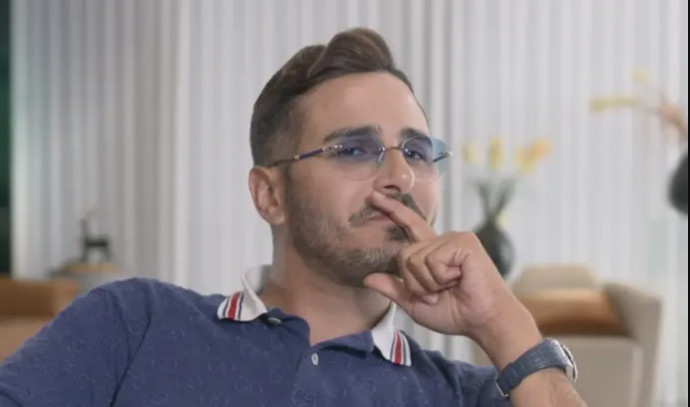Simon Leviev, who became the most searched Israeli on Google following a film in which he allegedly swindled women out of hundreds of thousands of dollars, is angling to become a reality TV star in a new series, The Simon Show on FreeTV.
He spoke to Maariv this week and addressed the allegations against him and accused his ex-girlfriend, Kate Conlin, of trying to extort money from him.
The new reality series promises to give an exclusive glimpse into the mind of Simon Leviev, of Tinder Swindler fame. The true-crime documentary came out on Netflix in February 2022 and showed that Leviev was pretending to be the son of billionaire Lev Leviev and stealing exorbitant sums of cash from women he met on Tinder.
Since the release of the infamous documentary, Leviev has only taken a few TV interviews and spoken very little about himself or the allegations made against him. However, this is beginning to change in the lead-up to his own show.
Leviev is proud of his record of being the most-searched Israeli on Google, and mentioned it several times during his interview with Maariv, despite the dubious circumstances under which he received the title.
Leviev embodies many paradoxes. He claims on the one hand that he is innocent and all accusations against him are lies; however, he is also riding on the infamy of his reputation, selling videos of personalized birthday greetings and talking about launching his own dating app.
To understand his story, Maariv goes back with him to his origins, starting with his name which he decided to adopt later in life after growing up ultra-Orthodox in Bnei Brak with the name Simon Hayut.
“I grew up as an ultra-Orthodox child, and I was always a kid who asked questions,” he said. “I don’t take anything for granted. And of course, the teachers in school don’t like it when you ask inappropriate questions. So they call you a heretic and, little by little, throw you out of the school. Starting in sixth grade I began to “fall” and move away from religion. I began to leave [religion] at 12 years old – I went to a yeshiva in the US where I was until age 17. Then, I returned to Israel and joined the army. I was in the Navy, and I left the service after eight months because it wasn’t compatible [with me].”
“I started working for a family in Herzliya, and my boss didn’t pay me on time. He gave me a postdated check, so I forged one and bought a car with it,” Leviev continued, explaining how he became a criminal. “I didn’t think about the consequences. At the age of 19, in 2010, I escaped the country with a forged passport because of this story, and I didn’t know what I was going to do or what the future held for me. I went on with my life, and in 2015, I was arrested for using a fake passport. After that I was deported back to Israel in 2017, and I was later arrested. I had to pay bail and then I got out of prison.”
Didn’t you think about the consequences of what you’re doing?
“When you do something, and you’re a child and alone, you don’t have very much common sense. I didn’t think about what would happen one year forward. Today I do things, and they have consequences and I think five to 10 years forwards. Then I didn’t care what would happen one month later. That’s how every person is at 19. It’s not like 31, and unfortunately, I learned that the hard way.
Why did you decide to change your name to Simon Leviev?
“My family cut me off, and the only person I was in contact with was my grandfather and he was very sick.
“In 2017, when I was extradited to Israel, I was in prison for a month, and when they released me, I wanted to go visit my grandfather, I found out he had passed away two months before I was released. I decided to put my entire life behind me.
“Simon and Shimon are the same name, and Leviev? I was a fan of the man who lived in Bnei Brak three streets from us. He was a man to look up to, and I said ‘I’ll put my life in the past, and everything’s okay.’ After that, I was in the country for four or five months, and I waited for my trial, and unfortunately, I ran awty again with a fake passport.
“Everything that apparently happens in the film – the claims against Simon Leviev – aren’t true because I never used the name Simon Leviev abroad. How can they claim they paid for hotels and flights for me if I hadn’t used the name?”
How exactly does that contradict the movie’s claims?
“I was wanted in the the State of Israel. You cannot use your real passport, so you use a different identification, a different age, I was on trial for it and I owned up to it. I served and I payed for it plenty, and in 2019, I was arrested in Greece with a fake passport in the name of David Sharon.
“I was put on trial and agreed to be given to Israel. I spent half a year in prison in Greece, and after that I served six months in prison in Israel, and that’s it. I was released on May 5, 2020.
“During my sentence, Netflix contacted my lawyer and said they made a movie about me. Since 2019, they’d said they were making the movie and offered me to take part in it. When I realised it was one-sided, I refused. I’m currently suing Netflix. We’re in negotiations to reach a settlement without making it to court. There’s a movie coming out in the next few months of my side, and Netflix themselves are working on a fictional show with actors about the ‘Tinder Swindler’.”
Did you present yourself as Leviev’s son?
No, I never presented myself [like that]. I repeat, I never used the name Leviev abroad, and I couldn’t have. I never used hotels and no one can have booked me a hotel because at the time the movie talks about, I didn’t use Leviev.”
So where did all the accusations come from?
“You have to understand that behind the production is money and things aren’t coming from nowhere. It’s Netflix’s most successful documentary movie, and it had a lot of power and marketing. A lot of people are behind it. It’s business and it’s ratings.
“It started with an article, and the article caught on, and it began rolling. The movie was watched by more than half a billion people in the world. If I was such a swindler like they made me out to be, I would be in prison.
“Look at any other investigative article against anyone else – suddenly 20-30 people come out and speak. For me, it’s all the same women. It’s clear that anyone trying to get publicity gets ratings.
Were the women in the movie actually your girlfriends?
I dated Cecile, and I met her three times in my whole life. The other two women were my friends, and one of them even said that. The third woman needed to read the things she was saying from the phone better. It was transparent.”
So what happened with Cecile? She’s no actress, her reaction didn’t look fake.
“When you receive a lot of money, it’s no problem to tell stories, and I cannot come and tell my side. I went out with her three times, and a few people told her I was an escaped criminal. They realised they could write some article. The fact that at the moment she’s emotional is her issue.
“The fact that a person cries in an interview doesn’t mean it actually happened. That’s her business. I know that people take acting classes and practice. For a good scene, you need to do 40 rehearsals.
‘When you see me playing the piano in the show, and when I smoke a cigar and smoke comes out my mouthm, we did a lot of takes. There’s lighting, you’re directed. You don’t just walk in the street and suddenly there’s a set.
“A TV interview doesn’t have rehearsals. I go and give the interview and what happens happens. Why do I need a director? If it’s real, why do you need lighting and microphones? People takes courses.
“I won’t reveal numbers, but Cecile received a lot of money,” Leviev insisted. “Let’s say that everyone’s claims in the movie amounted to $350,000. They launched crowd funding and made £800,000. Where did all the money go? To continue lying and showing interviews where everyone says a different amount? When people owe me money, I know exactly how much it is.”
Have you managed to speak to the women who came out against you?
“No, I don’t talk to liars and people who talk about me. I have lawsuits against them. I have nothing to say to people like that. There’s greed here, and there’s publicity. No one is doing this for nothing.
“Someone who is in debt cannot afford to fly. There’s no sense in what they’re saying. I was an ‘escaped criminal’, and I had private jets, I’m a character. I was wanted and I put my head down. They way they see it, there’s more clicks. They want stop, and it brings them money. Nobody does anything for nothing, and I will continue to do this for money.”
We heard recordings. You said serious things and threatened people. You cannot deny that
“They present recordings that aren’t related to the specific issue. If a couple gets divorced, of course they’ll say bad things about each other; if you make an investigative piece against some businessman, do you know what was in the deal?; if you fire an employee because she stole, of course she’ll say she isn’t guilty. And if I left my girlfriend because she cheated on me, every person in their own story will make their own excuses.
“They take recordings and do emotional manipulations. You’re a journalist, and you know how to present things. They put my words in the middle of other things.
“I’m not threatening [anyone] in the recordings. In English there’s no feminine or masculine [second person pronouns]. I say ‘thank you for everything you have done’, and that can be to the driver who picked me up. ‘Listen, give me the fucking money’ – there’s a recording of that. You think they didn’t edit it? The movie came out in 2022, and they’ve been working on it since 2019. Did you see documents? A single shekel that someone drew from an ATM?”
So what happened when you said ‘Listen, give me the fucking money’?
“I won’t go into every single message and everything that happened. In the movie that’s coming out I’ll give all the details. They took my things and my voice messages, and they manipulated them to look like I’m jumping from woman to woman. The reality is as far as west to east.”
From lovers to enemies
One of the mysterious women in Leviev’s story was Israeli model Kate Conlin who was his girlfriend for a year and a half. Konlin gave interviews and stood by him.
“These testimonies are as realistic as if you said I’m a WWE fighter,” she told N12. “Listen, the amounts they said he stole from them are worth the same as gifts he buys me on Saturday. It’s absurd. Why would he take tens of thousands from some woman when he regularly spends that much? It doesn’t make sense.”
Last April the two broke up, and in December, Conlin came out against Leviev for the first time in Chaim Etgar’s movie The Woman Who Brought Down the Tinder Swindler on N12 in which she claimed she had fallen for his scam and that she had been threatened to stand by him and present a glittering, photogenic relationship.
Even your biggest supporter came out against you and said you scammed her? Is she also lying?
“I didn’t want to be with her anymore and it ended badly when she understood she wouldn’t get any more money. The media paid her NIS 75,000. She’s blonde and they dyed her hair red so that she would look pathetic.
“I don’t think I was brought down. Is there a police investigation? Is there a 120-day restraining order? It’s ridiculous and it’s a lie.
“The moment she understood I wasn’t going to give her money, it was so easy for her to invent regrets. She called me and threatened me that she would say I hit her, so I said ‘you won’t accuse me of things like that.’ But to go and publicize these things, this ambush? The woman who brought me down? There was nothing there.
She understood that she would be remembered as the Tinder Swindler’s ex. Her blue check and her likes – I paid and this is what she tried to do to me. She acts in the movie, and it was her dream to get on the stage.
“I’m lucky these are the things people made up about me and not sexual abuse. Any person who lives their life understands that these things are ridiculous and have no reality. But I’m not stuck in my past. People choose to see me in a certain way because it works for them. Go tell people that I scammed you and I promise, you’ll be in a special edition.
“They attacked me, ambushed me on July 1,” claimed Leviev in reference to Etgar’s movie. “I filed a complaint against them in the police, and they took apart his set. My driver filmed them, and that ruined their surprise. If Etgar had come to me, I would have spoken to him. It doesn’t interest me, I don’t have anything to hide from anyone, and I don’t need to run from anyone.
“Adva Dadon offered me the questions ahead of time. Guy Peleg, 60 Minutes – anything I want I get on any global stage. They came just for the ratings.
“I have videos from my side that my driver took. How did Cecile get to Israel if she was in debt? She was just walking in the street and suddenly there’s a set? People don’t understand that they pay her money for hotels and flights. It’s all staged.
“‘The police say it’s a complicated case.’ Well, a year has gone by since they filmed it. I filed three lawsuits against Cecile and then I stopped myself to not make her miserable. What I did for her was because I have respect. She can talk, but that doesn’t cost money. She got publicity and here she is leaving the country. She doesn’t interest anyone.”
We heard recordings in which you sound like you’re threatening Kate
“You don’t see the other side, you don’t see the side in which a young woman got hurt on the stairs in the house and then goes and tries to create an excuse to go the hospital. She tries to blackmail you – ‘if you don’t give me an apartment for a year I’ll go to the police.’ The story is: She’s known me since 2010. She knows I’m not a violent person. But because she’s a woman, they won’t represent her properly. I won’t let anyone blackmail me for something that didn’t happen. This is not ladylike behavior. I have more tools at my disposal – stronger than Channel 12, stronger than Yisrael Bidur.”
Why do you think [people and the media] are clinging to you?
“Ratings. The film received the highest ratings on Netflix in two years. This advertisement made money, and even in a challenging life, a person has to pay money. The media receives money – it’s also a business. Also the newspaper you work at [needs advertisements]. I bring [high] ratings.”
Leviev’s docu-reality series is the first original production by the streaming network FreeTV – a choice that evidently also constitutes a statement about the company’s character. The show’s producers turn Leviev into a comic character while still showing quite a few authentic conversations and behaviors that often do not make the final edited cut of TV shows.
Why did you choose to make a series about your life?
“I received an offer – I won’t lie – that was economically [advantageous]. Also, the option to show my life – if I go live on TikTok, I can reach half a million people and if I post a story on Instagram I can reach 400,000 viewers. People think that I wake up in the morning and search for women on Tinder. [In reality TV,] you live with people – whether it’s merchandising or blessings. Everything was real, it was raw material. The director even put some things in that I really didn’t want to be in there.
“The series follows my life since the movie came out on Netflix – how I coped and what actions I took after the film [came out]. This is not my side [of the story]. My side is coming out in another film on HBO. This is a documentary series that follows me. They wanted to show a more human angle, my life, not only what you see from the outside or what comes from the media. There was no script. They put the ‘misses,’ the difficult things.
“People know the character of ‘Simon.’ This is the real Simon – who I am, how I deal with things. It’s a struggle that not many people have been able to deal with. For better or for worse [people will be able] to see a glimpse of my real life, what I do and what projects I’m working on.
“At the end of the day, I’m a human being like everyone else,” Leviev continues. “I’m not the monster they painted me to be. I don’t need to act like I’m poor for anyone, I don’t need to live in a tent or to drive a Toyota Yaris – or whatever else it is – if I can own a Ferrari I will drive a Ferrari, if I had stolen it from someone I would have been arrested, and I wasn’t arrested.
“People need to understand I’m a law-abiding citizen, that I’m not the monster that they created.
“There are hard things, where I cam from and the place I left behind. For example, take the fact that I changed my last name – people should respect that.
“People can change their gender but when I change my last name it’s suddenly fraud? That’s because it’s comfortable and brings in the ratings.
“I am also a human being, and I also have feelings,” adds Leviev in a monologue that may even be heartbreaking for those who have not watched The Tinder Swindler.
“I read the comments but they don’t even hurt me anymore, I’m one of the most searched for people on Google for the year 2022, not Gal Gadot and not [Benjamin] Netanyahu. I’m talking about more than one billion searches worldwide.
“On the street, I receive adoration without an end, people think that I ‘broke the system,’ and that’s also somewhat funny to me. I want people to know here I am, just Simon, and I also have feelings.”
Many Israelis feel uncomfortable with the representation of Israelis that you’ve brought to the screen – how do you feel about that?
“First of all, I don’t remember being chosen to be the country’s ambassador. My place of origin has nothing to do with the accusations.
“There are many people who find it difficult to support me here, but abroad people love and support [me].”
Finally, do you regret anything you did along the way?
“Everything I did, all the mistakes that I made, I’m at peace with them. I take everything as a lesson for life, there’s nothing else to do.
“The mistakes I made as a child – I’ve apologised for them, with money, by serving time, with violence.
“They treat me like I’m Hitler himself. I don’t want my body to be dragged around the town. It’s all lies, but if it was real – you’d still have to take things in proportion.”
This interview originally appeared in Maariv by Kaitz Brebner and was translated to English by Maya Zanger-Nadis, Ariella Marsden and Shira Silkoff.



